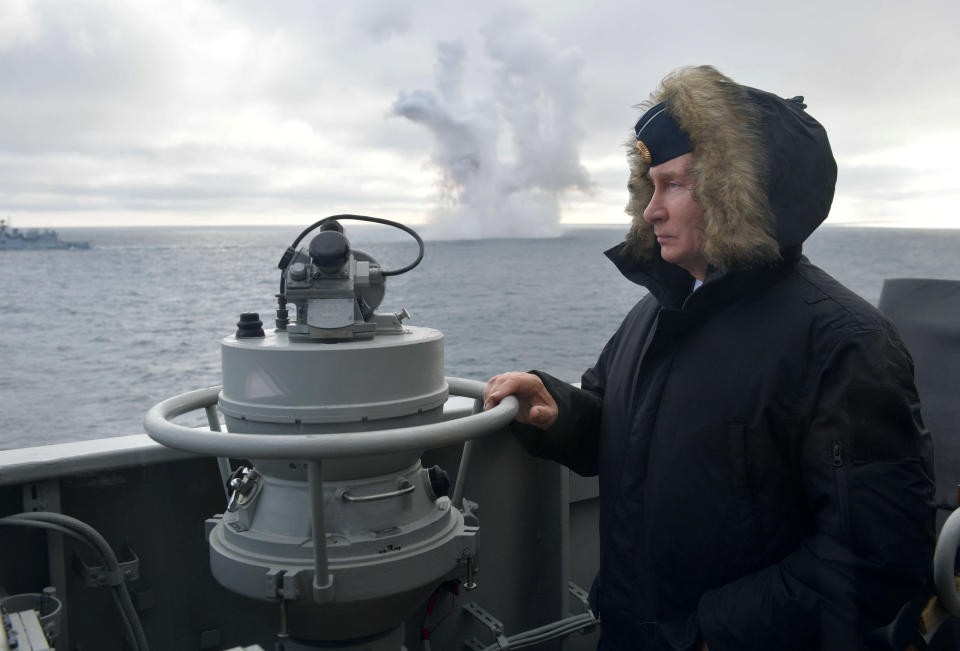Russia's hypersonic missiles are not 'game changing,' says U.S. Army Chief of Staff
WASHINGTON — The U.S. Army’s top officer said Tuesday during an appearance in Washington, D.C., that he isn’t worried by Russia’s growing arsenal of hypersonic missiles.
Asked during an appearance at the Atlantic Council whether he considered Russia’s deployment of its hypersonic arsenal “game changing,” Army Chief of Staff Gen. James McConville replied: “No, I don’t.”
“I have not seen them actually hit a target with that system, and I know where our [hypersonic] technology is,” he continued, “and I’m very comfortable with where our technology’s going and with the speed it’s going, so I don’t see it as game changing yet.”
Western analysts have speculated about Russia’s hypersonic weapons since Russian President Vladimir Putin disclosed in March 2018 that his military was developing an arsenal of “invincible” nuclear weapons.

The Russian Ministry of Defense announced Dec. 27 that it had established its first intercontinental missile regiment equipped with the Avangard hypersonic glide vehicle. The Russians probably designed the Avangard to defeat U.S. missile defenses by striking those defenses’ “key infrastructure,” such as command and control facilities, Michael Kofman, a Russian military expert at the Center for Naval Analyses, told Yahoo News.
A hypersonic weapon is usually defined as one that reaches speeds of at least Mach 5, or five times faster than the speed of sound. The Avangard reportedly flies at speeds of up to Mach 27, although Kofman warned against taking Russian claims at face value.
The Avangard is not the only hypersonic weapon in development by Russia. Another is the 3M-22 Zircon sea-launched cruise missile. Putin boasted about the new missiles during remarks to Russian defense officials on Dec. 24, when he claimed a lead over rivals in an arms race.
“Today we have a unique situation in our new and recent history,” he said. “They try to catch up with us. Not a single country possesses hypersonic weapons, let alone continental-range hypersonic weapons.”
Kofman said that if McConville was referring to the Avangard, he agreed with the general’s statement. “The capability is not game changing and does not alter the strategic balance between the United States and Russia, but it does have strategic implications.”
The Avangard will pose challenges, he said, because unlike a traditional ballistic missile that travels on a parabolic arc, the hypersonic weapon is maneuverable “and doesn’t travel on a predictable trajectory,” which means U.S. decision makers might have to decide how to respond before knowing whether the missile is headed for a purely military target or a large city.
As for McConville’s comment about not seeing the missile “actually hit a target” yet, Kofman said it was not unusual for Russia to field a system but then continue to improve it. “If they haven’t hit a target with it today, they may tomorrow or the next day or somewhere down the line,” he said.
However, the greater Russian threat “at the tactical and operational level” may come from the Zircon, Kofman added. “Zircon is going to have significantly more impact on the military balance and the correlation of forces in theater.”
President Trump spoke about the U.S. military’s development of hypersonic weapons during remarks he made about Iran at the White House Jan. 8.
“Our missiles are big, powerful, accurate, lethal and fast,” he said. “Under construction are many hypersonic missiles.”
_____
Read more from Yahoo News:
Did the U.S. 'assassinate' Iranian general or just kill him? Why it matters
Saudis warn of new destructive cyberattack that experts tie to Iran
Your Democratic primary cheat sheet: In the run-up to Iowa, who's still in the race?
PHOTOS: Ukraine International Airlines plane crashes in Iran killing all on board



